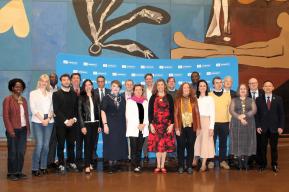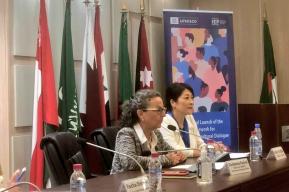مقال
مقاربة كونفوشيوسية لحقوق الإنسان

«على الإنسان أن يقوم بواجباته إزاء الآخرين بدل أن يُطالب بحقوقه. تلك هي القاعدة الأخلاقية للعلاقات الاجتماعية والسياسية في الصين. يمثل مفهوم الالتزامات المشتركة المبدأ الأساسي للكونفوشيوسية». هذا ما أكده الفيلسوف الصيني لو شونغ-شو (1903 - 1985) في النص الذي أرسله في أول يونيو 1947، ردا على تحقيق اليونسكو حول الأسس الفلسفية لحقوق الإنسان، تحت عنوان «حقوق الإنسان في التقاليد الصينية». مقتطفات.
بقلم لو شونغ-شو
قبل التمعّن في المبادئ العامة لحقوق الإنسان، أريد التذكير بأن المفكرين الصينيين القدامى لم يُعيروا اهتماما للموضوع، أو على الأقل بنفس الطريقة مُقارنة بالغرب. وقد نبحث طويلا، دون جدوى، عن إعلان لحقوق الإنسان في أعمال الفلاسفة وفي الدساتير السياسية لهذه البلاد قبل وصول المفهوم الغربي للحق إلى الصين. في الواقع، وجد المترجمون الأوائل لأعمال الفلسفة السياسية الغربية بعض الصعوبات لإيجاد ما يُعادل كلمة «حق» في اللغة الصينية. تتلخّص العبارة المستعملة حاليّا في كلمة واحدة «كوانلي» التي تعني حرفيا «السلطة والمصلحة»، وحسب علمي، تعود إلى كاتب ياباني استعملها لأول مرة سنة 1868 في كتاب حول القانون العام الغربي. ومن ثمّ، اعتمدها الكُتّاب الصينيون.
لا يجب، طبعا، أن نستنتج من ذلك أن الصينيين لم يُطالبوا أبدا بالحقوق الأساسية للإنسان ولم يتمتّعوا بها. في واقع الأمر، يعود ظهور مفهوم حق الإنسان في الصين إلى زمن بعيد، كما تمّ الاعتراف، منذ أمد طويل بحق الشعب في أن يثور على سلطان غاشم.
إن كلمة «ثورة»، وهي أبعد ما يكون على أن تُفهم بأنها خطيرة، مرتبطة ارتباطا وثيقا بمعنى «مثال أعلى»، وقد استعملت بصفة مستمرة للتدليل على حق الشعب في إسقاط الحكّام الفاسدين، حتى أن إرادة الشعب تُعتبر مطابقة للإرادة السماوية. إن كتاب التاريخ، وهو كتاب قديم كلاسيكي صيني، يُؤكّد أن «السماء ترى ما يراه الشعب، والسماء تسمع ما يسمعه الشعب. فالسماء مليئة بالتعاطف مع الشعب. وما يُريده الشعب سوف تمنحه له السماء».
على الحاكم أن يهتمّ بمصالح شعبه: ذلك واجبه أمام السماء. ولما يكون محبا لشعبه، فهو يستجيب لإرادة السماء. كما يُعلن هذا الكتاب «إن السماء تُحب الشعب، وعلى الحاكم أن يُطيع السماء».
إذا لم يعدالحاكم يكرس سلطته في سبيل سعادة رعاياه، يُصبح لهؤلاء الحق في أن يثوروا لِخلعه عن العرش. ولما تجبر الإمبراطور جياه (1818-1766 قبل المسيح) وأصبح طاغيا، وهو آخر امبراطور من سلالة هسيا (2205-1766 قبل المسيح)، قاد تانغ ثورة وأطاح بسلالة هسيا، مُعتبرا أن واجبه يُحتّم عليه الاستجابة لنداء السماء، أي الامتثال تماما لرغبة الشعب بالتخلي عن الحاكم السيء وتأسيس سلالة جديدة، وهي سلالة شانغ (1766-1122 قبل المسيح).
وعندما أصبح آخر امبراطور من سلالة تسو (1154-1122 قبل المسيح) مُستبدّا، وفاق الامبراطور السابق جياه ظلما، تم إعدامه أثناء ثورة قادها الملك وو (1122 قبل المسيح)، مؤسس سلالة زهو التي بقيت في السلطة على مدى 800 سنة (1122-296 قبل المسيح).
سجل تاريخ الصين قدوم وسقوط سلالات مُتعاقبة، مما يدل على أن ممارسة هذا الحق في التمرّد تكررت مرارا. وقد أكد منسيوس (372-289 قبل المسيح)، أحد أكبر مُريدي كونفوشيوس، أنه يجب على الحكومة أن تمتثل لإرادة الشعب. وكان يقول: «يحتل الشعب المرتبة الأولى من حيث الأهمية، والدولة أقل أهميّة منه، أما الملك فله أهميّة ضئيلة».
إلتزامات مشتركة
على الإنسان أن يقوم بواجباته إزاء الآخرين بدل أن يُطالب بحقوقه. تلك هي القاعدة الأخلاقية للعلاقات الاجتماعية والسياسية في الصين. يمثل مفهوم الالتزامات المشتركة المبدأ الأساسي للكونفوشيوسية. بالنسبة لكلونفوشيوس ومريديه، العلاقات الاجتماعية الأساسية هي التالية: أولا من الملك إلى رعاياه، ثانيا من الأولياء إلى الأطفال، ثالثا من الزوج إلى الزوجة، رابعا من الأخ الأكبر إلى الأخ الأصغر، وخامسا من الصديق إلى الصديق.
وعوضا عن المطالبة بالحقوق، تدعو الأخلاق الصينية إلى سلوك يتّسم بالتفهّم إزاء الغير. على كل فرد أن يعترف لغيره بنفس الرغبات، وبالتالي بنفس الحقوق التي يريدها لنفسه. إن الوفاء بالالتزامات المشتركة يعني أيضا الامتناع عن الإضرار بالحقوق الفردية للغير. وبخصوص العلاقة بين الفرد والدولة، فإن النظام الأخلاقي ينصّ على أن «الشعب هو ركيزة الأمّة، وعندما تكون الركيزة متينة تعيش الأمة في سلام».
في زمن بعيد، كانت الطبقة الحاكمة والأفراد الذين تتم دعوتهم للانضمام إليها، هم الوحيدون الذي يتلقّون تعليما كلاسيكيا. لم يكن عامّة الشعب يتعلّمون المطالبة بحقوقهم، لكن أعضاء الطبقة الحاكمة، الحاضرين منهم أو الذين يُفترض أن يلتحقوا بهم، كانوا يتعلّمون باستمرار أن أول واجب للحكومة هو السهر على مصالح الشعب. وكان يُلقّن إلى الملك وإلى الموظفين أن يعتبروا أنفسهم أولياء على الشعب أو حرّاسه وأن يقوموا بحمايته كما لو كانوا يحمون أطفالهم. ولئن لم يتم دائما تطبيق هذا المبدأ على أرض الواقع، إلا أنه بقى ركيزة السياسة الصينية. أما نقطة الضعف فتتمثّل في أن سعادة الشعب تقع بين أيدي الطبقة الحاكمة الميالة إلى التنكّر لواجباتها وإلى استغلال الشعب. وهو ما يُفسّر الثورات المتواترة في تاريخ الصين. [...]
الفنان: غو واندا
Lo Chung-Shu
Before considering the general principles, I would like to point out that the problem of human rights was seldom discussed by Chinese thinkers of the past, at least not in the same way as it was in the West. There was no open declaration of human rights in China, either by individual thinkers or by political constitutions, until this concept was introduced from the West. In fact, the early translators of Western political philosophy found it difficult to arrive at a Chinese equivalent for the term “rights”. The term we use to translate “rights” now is two words “Chuan Li”, which literally means “power and interest” and which, I believe, was first coined by a Japanese writer on Western Public Law in 1868, and later adopted by Chinese writers.
This of course does not mean that the Chinese never claimed human rights or enjoyed the basic rights of man. In fact, the idea of human rights developed very early in China, and the right of the people to revolt against oppressive rulers was very early established.
“Revolution” is not regarded as a dangerous word to use, but as a word to which high ideals are attached, and it was constantly used to indicate a justifiable claim by the people to overthrow bad rulers; the Will of the People is even considered to be the Will of Heaven. In the Book of History, an old Chinese classic, it is stated: “Heaven sees as our people see; Heaven hears as our people hear. Heaven is compassionate towards the people. What the people desire, Heaven will be found to bring about”.
A ruler has a duty to Heaven to take care of the interests of his people. In loving his people, the ruler follows the Will of Heaven. So it says in the same book: “Heaven loves the people; and the Sovereign must obey Heaven”.
When the ruler no longer rules for the welfare of the people, it is the right of the people to revolt against him and dethrone him. When the last ruler Chieh (1818–1766 B.C.) of the Hsia Dynasty (2205–1766 B.C.) was cruel and oppressive to his people, and became a tyrant, Tang started a revolution and overthrew the Hsia Dynasty. He felt it was his duty to follow the call of Heaven, which meant obeying exactly the Will of the people to dethrone the bad ruler and to establish the new dynasty of Shang (1766–1122 B.C.)
When the last ruler of this dynasty, Tsou (1154–1122 B.C.), became a tyrant and even exceeded in wickedness the last ruler Chieh of the former dynasty, he was executed in a revolution led by King Wu (1122 B.C.) who founded the Chou Dynasty, which in turn lasted over 800 years (1122–296 B.C.). [...]
The right to revolt was repeatedly expressed in Chinese history, which consisted of a sequence of setting up and overthrowing dynasties. A great Confucianist, Mencius (372–289 B.C.), strongly maintained that a government should work for the Will of the people. He said: “People are of primary importance. The state is of less importance. The sovereign is of least importance”.
Mutual obligations
The basic ethical concept of Chinese social political relations is the fulfilment of the duty to one’s neighbour, rather than the claiming of rights. The idea of mutual obligations is regarded as the fundamental teaching of Confucianism. The five basic social relations described by Confucius and his followers are the relations between (1) ruler and subjects, (2) parents and children, (3) husband and wife, (4) elder and younger brother and (5) friend and friend.
Instead of claiming rights, Chinese ethical teaching emphasized the sympathetic attitude of regarding all one’s fellow men as having the same desires, and therefore the same rights, as one would like to enjoy oneself. By the fulfilment of mutual obligations, the infringement of the rights of the individual should be prevented. So far as the relation between the individual and state is concerned, the moral code is stated thus: “The people are the root of the country. When the root is firm, the country will be at peace.”
In the old days, only the ruling class, or people, who would be expected to become part of the ruling class, got the classical education; the mass of the people were not taught to claim their rights. It was the ruling class or would-be ruling class who were constantly taught to look upon the interest of the people as the primary responsibility of the government. The sovereign as well as the officials were taught to regard themselves as the parents or guardians of the people, and to protect their people as they would their own children. If it was not always the practice of actual politics, it was at least the basic principle of Chinese political thought. The weakness of this doctrine is that the welfare of the people depends so much on the goodwill of the ruling class, who are much inclined to fail in their duties and to exploit the people. This explains the constant revolutions in Chinese history. [...]
Artist: Gu Wenda
Lo Chung-Shu
A professor of philosophy at the West-China University, Chengdu, Sichuan, the Chinese scholar Lo Chung-Shu (1903-1985) was also a special consultant for UNESCO.









